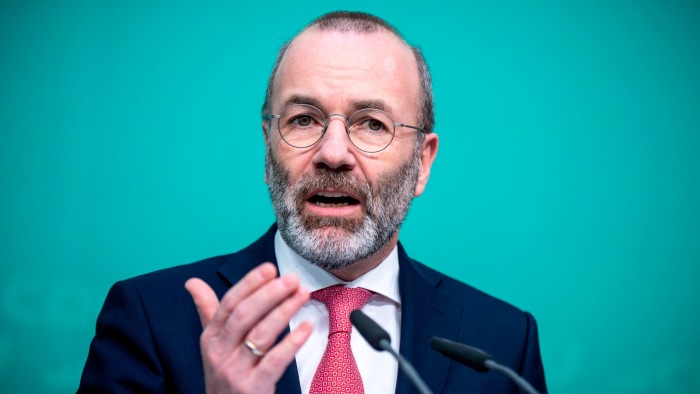This article is an on-site version of our Europe Express newsletter. Premium subscribers can sign up here to get the newsletter delivered every weekday and fortnightly on Saturday morning. Standard subscribers can upgrade to Premium here, or explore all FT newsletters
Good morning. Italy’s Giorgia Meloni is meeting Donald Trump at the White House today, hoping to use their personal rapport to jump-start EU trade talks that have failed to get traction. Meanwhile, China is seeking rapprochement with the EU to soften the blow of the trade war, but significant hurdles remain.
Today, the head of the EU’s most powerful party denies “structured co-operation” with the far right, and our tech correspondent reports on the rise of homegrown European cloud companies.
There will be no newsletter tomorrow; we’re back on Tuesday. Have a great Easter weekend!
Veering centrist
The chief of the centre-right European People’s party (EPP) has vowed to avoid co-operation with the far right in the European parliament, promising his party would help defeat Europe’s “authoritarian wave”, write Andy Bounds and Alice Hancock.
Context: Centrist groups, who voted with the EPP to install its candidate Ursula von der Leyen as European Commission president last year, have condemned its frequent support for positions shared with the far-right Patriots and nationalist European Conservatives and Reformists (ECR).
Manfred Weber, head of the EPP, defended the group’s collaboration with sections of the ECR, such as the Brothers of Italy, Belgium’s NVA and the Czech ODS, who are all in power domestically.
But he denied any “structured co-operation” between his party and the Patriots, the third-biggest party, which includes the parties of Hungary’s Viktor Orbán and French far-right leader Marine Le Pen.
“I guarantee that none of them have an official role in the European parliament — the cordon sanitaire is fully implemented,” Weber told the FT in an interview.
He pointed out that many national leaders, such as Donald Tusk in Poland and Friedrich Merz in Germany, faced domestic competition from further on the right, rather than the left.
In Berlin, Merz has agreed to form a coalition government with the Social Democrats, which Weber said should also improve collaboration with the Socialists in the European parliament.
According to the Bavarian politician, Brussels’ drive to cut red tape and curb immigration were essential to fight off the populist threat, but Weber also complained that his erstwhile Socialist allies in the European parliament were not co-operating in this effort.
“Stop your ideological battles, come to the negotiating table and start finally to talk on content,” Weber said.
One official from a centrist party said that while in open voting sessions “co-operation is better”, at the committee level and in closed meetings, the EPP still regularly made deals with the ECR and the Patriots.
“We want to be constructive and contribute for the stability and predictability for our people and businesses,” said a spokesperson for the Socialists. “This can only be achieved through the [von der Leyen] majority, not with short-sighted alliances with the far right,” they added, referring to the centrist coalition between the EPP, Socialists, Greens and the liberal Renew.
Chart du jour: Taking over
Santander has overtaken UBS as continental Europe’s most valuable bank after Trump’s tariff-induced market rout hit the Swiss lender harder than peers.
Cloudy
European governments and companies are increasingly turning to homegrown tech companies to reduce their reliance on American tech, the CEO of a French cloud service provider OVHcloud Benjamin Revcolevschi tells Barbara Moens.
Context: Europe is waking up to its heavy reliance on American digital infrastructure and services, leading to growing calls for more tech sovereignty.
Cloud computing is one area that is especially dominated by American giants, with OVHcloud presenting itself as a viable European alternative. It is also among a growing number of companies calling on public institutions to favour European companies in their contracts.
In results published this morning, OVHcloud announced a 10 per cent growth in consolidated revenue for the first quarter, compared to the same period last year, amounting to a total revenue of €536mn. Almost half of that comes from France, and other European countries account for 29 per cent.
“Geopolitics has entered the board rooms,” Revcolevschi told the FT.
He said that the German Commerzbank was one of the latest examples of a company switching to OVHcloud to ensure their data sovereignty.
Previously, data leaks and cyber security had frequently been the main concerns about cloud services, Revcolevschi said. “Now, companies realise that extraterritorial laws or extraterritorial decisions . . . could have an impact on their cloud services or that could lead to a shutdown of their services.”
He said that the global uncertainty of the past months helped spark the debate around digital sovereignty in Europe. “Sometimes you have to hit the wall to realise what’s going on. That’s what’s happening today.”
What to watch today
-
Italian Prime Minister Giorgia Meloni meets US President Donald Trump in Washington.
-
French President Emmanuel Macron hosts US secretary of state Marco Rubio and special envoy to the Middle East Steve Witkoff in Paris.
Now read these
Recommended newsletters for you
Free Lunch — Your guide to the global economic policy debate. Sign up here
The State of Britain — Peter Foster’s guide to the UK’s economy, trade and investment in a changing world. Sign up here
Are you enjoying Europe Express? Sign up here to have it delivered straight to your inbox every workday at 7am CET and on Saturdays at noon CET. Do tell us what you think, we love to hear from you: [email protected]. Keep up with the latest European stories @FT Europe
